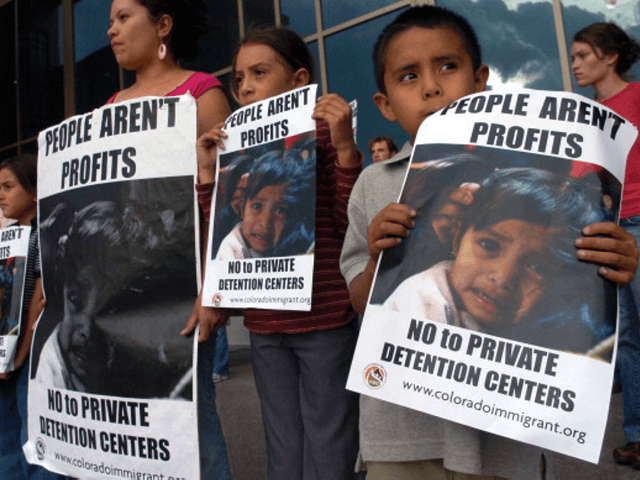More than 60,000 illegal aliens housed in a Colorado detention center are suing for forcing them to perform housekeeping chores. They allege the center compelled “forced labor” in violation of federal human trafficking laws. The defendant contractors say the claims are unprecedented.
The detainees sued for money damages and restitution.
The lead plaintiff in the lawsuit, Alejandro Menocal, stayed in the facility for three months while he was facing deportation. He said, “It’s their job to run the facility, and instead they used and abused us to run the facility, and that’s why we’re suing.”
Lawyers for the defendant says no other court has ever recognized trafficking or unjust enrichment claims for cleaning bathrooms, serving meals, doing laundry, and performing other housekeeping duties. They write that in spite of this fact, the district court denied the company’s motion for an immediate appeal on the merits, “thereby shielding the merits from this Court’s review.” They assert, “Such unprecedented claims deserve extra vigilance to ensure that class certification based on them follows ‘rigorous analysis’.”
The contractor who operates the Colorado facility has filed court documents asking for permission to appeal the judge’s ruling that the illegal aliens can proceed as a class action.
Lawyers for GEO Group, Inc. (GEO) write that the district court’s class certification “presents legally unsettled issues of national importance and manifest errors that warrant immediate review.” They ask the U.S. Court of Appeals for the Tenth Circuit to decide whether the federal district court properly certified classes authorizing an alleged 60,000 immigration detainees to seek monetary relief.
In particular, the defendant-petitioner asks the Tenth Circuit to determine:
(1) Does a contractor operating a detention facility for the federal government compel ‘forced labor’ in violation of a federal human trafficking statute by requiring detainees to periodically perform housekeeping chores, when that contractor and its housekeeping policies are subject to extensive federal contractual and regulatory requirements as well as direct federal supervision, and the housekeeping policy is both longstanding and judicially-accepted?
(2) Is the contractor ‘unjustly enriched,’ and required to pay restitution to detainees for the detainees’ participation in a federally-created, sponsored and supervised voluntary work program, when the settled expectation for decades has been that participants are provided a daily allowance of $1?
GEO operates immigration detention facilities under contracts with the U.S. Department of Homeland Security (DHS) and Immigration and Customs Enforcement (ICE). They have operated the Aurora, Colorado detention facility since 1986.
The federal contractor urges they are subject to extensive contractual, regulatory and statutory requirements and having illegal aliens do housekeeping chores is a long-standing practice that has been signed off by the courts.
The ICE detainees sued saying the contractor was unjustly enriched under Colorado law when the defendant had them work for a daily allowance of $1. GEO argues that the Voluntary Work Program (VWP) has been authorized by Congress and the $1 daily allowance is reimbursed by ICE.
In their “Petition for Permission to Appeal Class Certification,” GEO argues that Congress passed the Trafficking Victims Protection Act (TVPA) to punish human traffickers, not to award damages to illegal aliens who must be housed in a detention facility after they illegally enter the country. Moreover, they say that the district court did not demand any evidence but made its decision to certify the lawsuit as a class action “based solely on presumptions and inferences.” The district court did not have any evidence that even one detainee expected to receive more than the daily allowance. Detainees are not employees and should not expect special treatment, GEO writes.
The Immigration and Nationality Act (INA) authorizes DHS/ICE to detain aliens while they are waiting for removal or hearings and requires that ICE detains certain classes of immigrants. ICE requires that detention facilities “maintain the highest sanitation standards at all times in all locations without exception.” There is a supervised program of daily cleaning by all detainees, and GEO implements these requirements “through an ICE-approved program.” “Nobody trafficked them there.” The district court should have granted their motion to dismiss the lawsuit, they urge.
Issuing a questionable class certification order could force the federal contractor to enter into a settlement. GEO is the only defendant in the case. The contractor urges that they based their contract with the federal government on the assumption that the sanitation policy and daily allowance would continue to withstand legal scrutiny (as it has “for decades,” they write). The district clerk’s certification of a class of plaintiffs that consists of all those detained at the facility over the past ten years presents “a potentially catastrophic risk” to GEO’s ability to honor their contracts.
The alien detainees also claim that GEO violated Colorado’s minimum wage laws.
The lawyers for the detainee plaintiffs responded to GEO’s petition to appeal the class certification saying they oppose the appeal. They argue that the district court’s order is not a “death knell” for the litigation and the district court did not commit manifest error because the class certification issues “are not novel.”
Lana Shadwick is a writer and legal analyst for Breitbart Texas. She has served as a prosecutor and associate judge in Texas. Follow her on Twitter @LanaShadwick2.

COMMENTS
Please let us know if you're having issues with commenting.